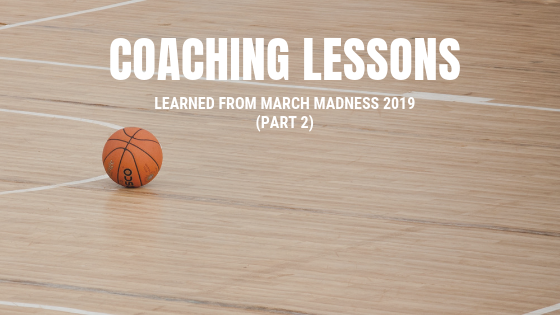In part 1 of this blog series, I discussed the benefit of a strong defense, how to take advantage of adversity, and how to stay composed when you and your team find themselves in a difficult situation. This past March Madness has brought forth many lessons that both coaches and players can learn from. Here are a few others worth mentioning.
Know Your Speed
Basketball teams can be effective at any speed, whether it is up or down-tempo. This year’s NCAA Men’s Champions, Virginia, were actually the slowest teams in college basketball, ranking 353rd among 353 teams in number of possessions per 40 minutes. The Cavaliers would move slowly up the court, taking their time to look for the best plays possible, or setting up screens. They would then patiently pass the ball around until the best opportunity for a shot showed itself.
This worked wonders for Virginia’s offense. However, that does not mean that slower = better. The Duke Blue Devils and North Carolina Tar Heels both had very high-tempo offenses with efficiency ratings just as impressive as the Cavaliers’. So, learn how your team plays best.
Avoid Frustration Fouls
It’s very easy to let emotions get the best of you during an intense game. Allowing these emotions to turn into pointless fouls, however, is never advised. There’s a difference between good and bad fouls, the bad ones being made purely out of frustration. Don’t let these result in a total breakdown, or worse, a loss.
When Virginia faced off against the Auburn Tigers, they took a 10-point lead with just over 4 minutes left in the game. Ty Jerome, the Cavaliers’ starting point guard, then committed a foul in the backcourt that was clearly an act of frustration. Just before then, he was a part of a play in which he felt that he was fouled, but nothing was called. This was his fourth and final foul forcing him to sub out of the game. Auburn took immediate advantage of this and went on a 14-0 run, but Virginia was able to hold onto their lead.
These careless fouls can very easily change the momentum of a game. As a coach, talk to your players about the importance of keeping their emotions in check and not letting their frustrations be the decider in a close game.
Keep Your Head Up
The hard truth of sports is that you are likely to experience a heartbreaking loss every now and then. What defines you as a coach (or player) is how you react to that loss. Both the Michigan State Spartans and Auburn Tigers were one game away from reaching the National Championship. Coming off a loss like that, it’s hard to remain optimistic, but not impossible.
Always remember that losing is a part of sports and something that will ultimately define you as a player, coach, and person. Simply keep your head up, keep practicing, and strive for an even better outing next time.


